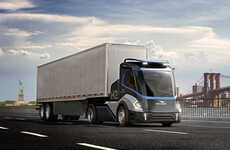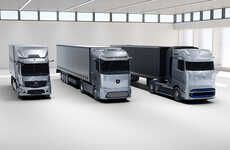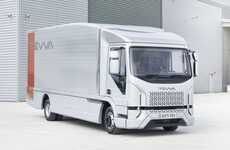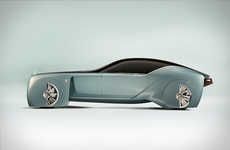
Siemens and Scania Created a Highway in Sweden to Reduce Carbon Emissions
Laura McQuarrie — June 24, 2016 — Autos
Carbon emissions can be extremely taxing on the environment, so Siemens and Scania collaborated on the creation of an electric highway in Sweden.
This highway spans 1.2 miles and makes it possible for trucks with a pantograph to connect to the overhead contact lines in order to receive electric energy. This means that in the process, vehicles are able to temporarily stop running their fuel-burning engines and automatically make the switch from consuming electric energy once the lines stop.
Scania describes this electric highway project as "one important milestone on the journey towards fossil-free transport." After the tracks are tested on this highway, it will be decided if there is room to implement this idea across the country.
This highway spans 1.2 miles and makes it possible for trucks with a pantograph to connect to the overhead contact lines in order to receive electric energy. This means that in the process, vehicles are able to temporarily stop running their fuel-burning engines and automatically make the switch from consuming electric energy once the lines stop.
Scania describes this electric highway project as "one important milestone on the journey towards fossil-free transport." After the tracks are tested on this highway, it will be decided if there is room to implement this idea across the country.
Trend Themes
1. Electric Transportation - The development of electric highways presents disruptive innovation opportunities in the transportation industry by reducing carbon emissions and promoting sustainable mobility.
2. Smart Infrastructure - The creation of electric highways highlights the potential for smart infrastructure solutions to support the integration of electric vehicles and renewable energy sources.
3. Alternative Energy Sources - The electric highway project in Sweden demonstrates the need for further exploration and investment in alternative energy sources to power transportation and reduce reliance on fossil fuels.
Industry Implications
1. Transportation - The implementation of electric highways can disrupt the transportation industry by driving the adoption of electric vehicles and reducing carbon emissions.
2. Renewable Energy - The collaboration between Siemens and Scania for the electric highway project signifies the potential for renewable energy industries to support sustainable transportation solutions.
3. Smart Infrastructure - The development of electric highways calls for advancements in smart infrastructure technologies to support the integration of electric vehicles into existing transportation systems.
2.7
Score
Popularity
Activity
Freshness























